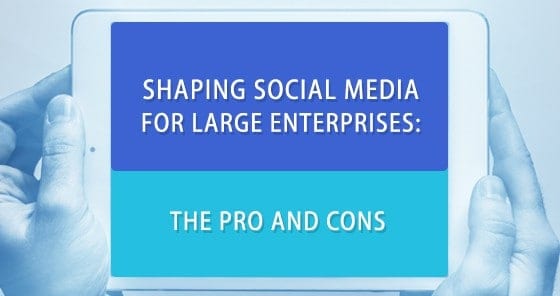Social media marketing is frequently the topic of misunderstanding. At times speaking different languages and having divergent goal alignment, social media marketers and corporate management can fail to reach consensus.
Add to the mix the fact that social media channels are dynamic and evolving, and you can see that a marketing endeavor employing them requires crafting: there is no one-size-fits-all social media marketing scheme.
Like any marketing effort, there are advantages and disadvantages to using social media. Understanding how social media works, how participants interact, is critical to keeping your enterprise agile.
Why Bother With Social Media
The answer: a quarter of the globe uses it.
Before you say ‘fad’ let’s look at the data.
In 2011 Regus[1] conducted a survey of more than 17,000 senior managers and business owners in 80 countries. Social media marketing was found in general to be a useful business tool.
- 74% of those queried considered social media to be essential for success.
- 7% increase of companies finding new clients through social media compared to the year previous.
- Across the globe 5% of businesses using social media to obtain new business saw increased profits; 6% experienced increased revenue compared to companies not prospecting through social media.
A key indicator of the healthy state of social media is the proliferation and vitality of channels. Social media has overtaken search engines as the most visited sites – and fully half of the US population visits a social networking site every day.
“Reflecting the rapidly ascending parabola of social media, this professional social networking research found that as many as 47% of firms globally are successfully using social media networking to find new business, 7% more than a year ago. China and India are leaders in this activity with fully 65% of Chinese firms and 61% of Indian firms declaring that they successfully use social media to acquire new customers….44% of business globally also believe that more new customers are reaching out to them through social networks.”[2]
Wobbling Confidence
Given this data, it’s strange to see that studies have shown that a majority (80%) of CEOs mistrust social media. The answer is something every social media marketer knows in his bones: it’s difficult to communicate social media marketing ROI.
For management, the ideal is a one-size-fits-all social media marketing strategy that can deliver hard data showing increase sales. Marketers, however, understand that social media is a multivalent endeavor: social media activity has an extension beyond just sales.
Where The Misunderstanding Starts
The 20th century saw a succession of revolutions in business marketing methods – revolutions that have fundamentally changed the way we think and act. After the Second World War advertising became an increasingly common component of our everyday lives. Where previously marketing messages were confined largely to print media, the rise of the radio and later television made it possible for a dramatic increase to the number of marketing messages a person experienced every day.
This increased marketing activity, in turn, conditioned audiences.
Where before the US population had been primarily thrifty savers, the marketing revolution transformed the saver into a consumer. Swept away in the mass media messages was older distrust of big business and banks. The new attitudes favored spending a larger percentage of income on a growing variety of goods. The modern economy is based on this transformation.
Marketing was able to work its economic miracle by making the average American excited about new products and respond to promotions about them. But the relationship between business and consumer at that time was largely passive: corporations pitched products, consumers bought them. This state of affairs held steady, despite a growing mistrust of marketing messages: it didn’t matter if the consumer was weary of trite promises. That consumer continued to buy what was promoted.
Social Media Has Totally Changed The Business-Consumer Relationship
The older passive consumer relationship contained the seeds of its transformation. The rise of mobile devices and inexpensive internet access has given the industrialized world a new way to communicate. And as this communication – permeable, adaptive, responsive – grew in volume, a radical shift in the average citizen’s expectation of communication took hold.
We no longer want to sit and listen. We demand flexibility and the ability to share. We are jaded, likely to reject the marketing messages of a decade ago.
The new consumer wants a social overlay to the mercantile act. They want a connection – this is a remedy for the skepticism of consumers.
CEOs who dismiss the value of social media fail to grasp that consumers have entered into an active relationship with business. The older ROI-centric paradigm and the expectations it generates for marketers no longer comprehends the totality of business reality.
Where It Leaves You: The Advantages And Disadvantages Of Social Media
Crafting a successful social media marketing strategy demands that you understand the strengths and limits of digital for a.
The Pros
- Consumers expect it. Vehemently. They want a platform to communicate with businesses.
- Consumers want to shop corporations. The modern consumer is likely to research a purchase before making a commitment. Social media is the means most often employed.
- Filling up the corners. You can net customers missed by traditional marketing endeavors.
- Build brand loyalty like never before. Social media allows you to interact with major influencers. By reaching out to your biggest fans, you position yourself well with your entire audience.
- Customer service. Social media is one of the most effective means to gather a rich array of data about how your customers feel about your products and services.
- Reputation management. Recalling that consumers shop business, social media is a highly effective means of addressing negative comments in the digital space.
- Adaptability. Social media complements your other marketing efforts – from your website to events and expos.
The Cons
- Social media requires a major investment in time and resources. To do the thing well means that sites and pages must be maintained, comments monitored, high-quality content created and approved.
- Creativity is at a premium. Digital messages are proliferating. To engage consumers you need to weld exciting material with relevance.
- Control is lost. The social media world is the wild west – anything you put there is liable to get grabbed. Your audience is free to criticize you, and without careful management, the negativity can snowball into a consumer backlash.
- It takes time. Achieving popularity is usually a gradual process. Consistency and patience are necessary to lay a sound foundation for you to build upon.
- Return on investment is delayed. Setting realistic sales goals for your social media marketing campaign is a critical aspect of strategy.
- Benefits are hard to measure. For many, this is the thorn in the flesh.
Social media is not just about sales. Taking that perspective ensures your marketing will likely fail. The latest Global Trend Report from Tata Consultancy Services includes social media among its five core transformative technologies. Critically, the major use of social media seems to be moving beyond yielding direct sales:
Digital Leaders are most likely to focus their efforts on using digital technologies to deliver greater insights into customer behaviour and expectations. Among them, 74% are focused on using digital initiatives to more accurately predict demand for their products or services, with 66% prioritizing initiatives that allow them to monitor how customers are using products or services in order to identify the need for new offerings.
Currently, businesses are relying primarily on mobile apps and social media analysis as sources of data on their customers. Both of these technologies are used by half of the respondents.[3]
Conclusion
It’s difficult to maintain the position that social media is a fad whose activity is tangential to the core goals of a business. Social media is a conversation – a vibrant, complex exchange among the majority of the industrialized world. It is potentially a marketplace, but not exclusively so. Assessing the utility and value of a social media marketing endeavor strictly by sales ignores its contributions to brand placement and loyalty, to the fostering of repeat purchasing, to the maintenance of a reputation for probity, quality products, and services.
For a large corporation, social media is a precision tool with which to measure and analyze a consumer base in real time. By learning how consumers want to communicate, social media refines and makes more efficacious the conversations between business and consumer.
Getting the most from social media calls for creativity tempered with experience. Zen Media has the tools you need to keep your enterprise agile in the digital landscape. Contact us today.









